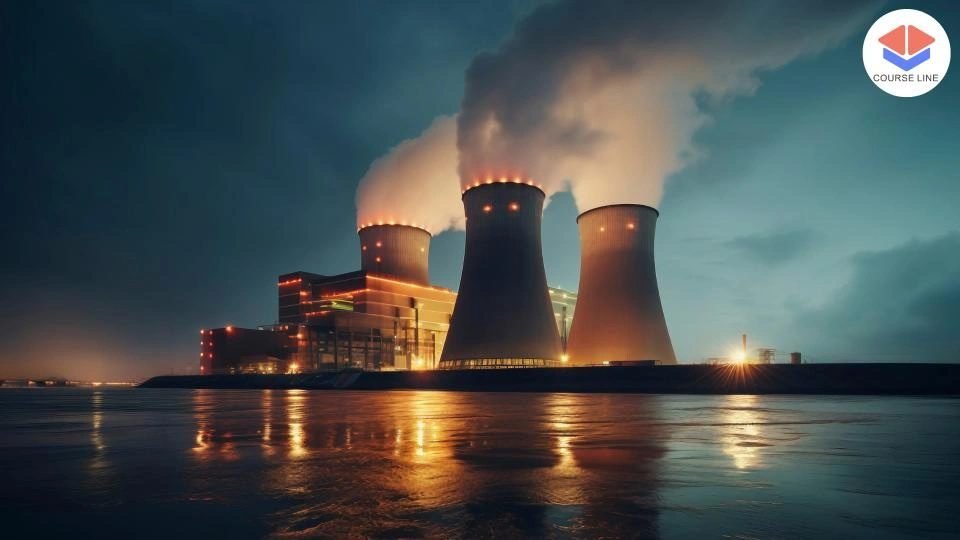Course Features
Price
Study Method
Online | Self-paced
Course Format
Reading Material - PDF, article
Duration
5 hours, 45 minutes
Qualification
No formal qualification
Certificate
At completion
Additional info
Coming soon
- Share
Overview
The Nuclear Engineering Level 3 Advanced Diploma is designed for individuals eager to gain a comprehensive understanding of one of the most powerful and complex fields in energy production. This course begins with a foundational introduction to nuclear engineering, covering the historical context and essential principles of nuclear physics, followed by an overview of current technological trends in the industry.
Learners will delve into the mechanics of nuclear reactors, examining various configurations, neutron behavior, reactor kinetics, and critical safety control systems. The course then guides students through the entire nuclear fuel cycle—from uranium mining and enrichment to fuel fabrication, operation, depletion, and the crucial subject of radioactive waste management.
Participants will also study the structural and functional components of nuclear power plants, with a special focus on thermal hydraulics and plant safety systems. A dedicated module on radiation protection addresses both theoretical principles and real-world safety protocols, including health impacts, regulatory compliance, and emergency response strategies.
Further modules cover the legal and ethical framework surrounding nuclear energy in the UK and internationally, along with case studies of notable nuclear incidents to promote a deep understanding of industry accountability. The course concludes with a look toward the future of nuclear engineering, covering advanced reactor designs, fusion energy, and emerging technologies shaping the next generation of power solutions.
Who is this course for?
The Nuclear Engineering Level 3 Advanced Diploma is designed for individuals eager to gain a comprehensive understanding of one of the most powerful and complex fields in energy production. This course begins with a foundational introduction to nuclear engineering, covering the historical context and essential principles of nuclear physics, followed by an overview of current technological trends in the industry.
Learners will delve into the mechanics of nuclear reactors, examining various configurations, neutron behavior, reactor kinetics, and critical safety control systems. The course then guides students through the entire nuclear fuel cycle—from uranium mining and enrichment to fuel fabrication, operation, depletion, and the crucial subject of radioactive waste management.
Participants will also study the structural and functional components of nuclear power plants, with a special focus on thermal hydraulics and plant safety systems. A dedicated module on radiation protection addresses both theoretical principles and real-world safety protocols, including health impacts, regulatory compliance, and emergency response strategies.
Further modules cover the legal and ethical framework surrounding nuclear energy in the UK and internationally, along with case studies of notable nuclear incidents to promote a deep understanding of industry accountability. The course concludes with a look toward the future of nuclear engineering, covering advanced reactor designs, fusion energy, and emerging technologies shaping the next generation of power solutions.
Requirements
The Nuclear Engineering Level 3 Advanced Diploma is designed for individuals eager to gain a comprehensive understanding of one of the most powerful and complex fields in energy production. This course begins with a foundational introduction to nuclear engineering, covering the historical context and essential principles of nuclear physics, followed by an overview of current technological trends in the industry.
Learners will delve into the mechanics of nuclear reactors, examining various configurations, neutron behavior, reactor kinetics, and critical safety control systems. The course then guides students through the entire nuclear fuel cycle—from uranium mining and enrichment to fuel fabrication, operation, depletion, and the crucial subject of radioactive waste management.
Participants will also study the structural and functional components of nuclear power plants, with a special focus on thermal hydraulics and plant safety systems. A dedicated module on radiation protection addresses both theoretical principles and real-world safety protocols, including health impacts, regulatory compliance, and emergency response strategies.
Further modules cover the legal and ethical framework surrounding nuclear energy in the UK and internationally, along with case studies of notable nuclear incidents to promote a deep understanding of industry accountability. The course concludes with a look toward the future of nuclear engineering, covering advanced reactor designs, fusion energy, and emerging technologies shaping the next generation of power solutions.
Career path
The Nuclear Engineering Level 3 Advanced Diploma is designed for individuals eager to gain a comprehensive understanding of one of the most powerful and complex fields in energy production. This course begins with a foundational introduction to nuclear engineering, covering the historical context and essential principles of nuclear physics, followed by an overview of current technological trends in the industry.
Learners will delve into the mechanics of nuclear reactors, examining various configurations, neutron behavior, reactor kinetics, and critical safety control systems. The course then guides students through the entire nuclear fuel cycle—from uranium mining and enrichment to fuel fabrication, operation, depletion, and the crucial subject of radioactive waste management.
Participants will also study the structural and functional components of nuclear power plants, with a special focus on thermal hydraulics and plant safety systems. A dedicated module on radiation protection addresses both theoretical principles and real-world safety protocols, including health impacts, regulatory compliance, and emergency response strategies.
Further modules cover the legal and ethical framework surrounding nuclear energy in the UK and internationally, along with case studies of notable nuclear incidents to promote a deep understanding of industry accountability. The course concludes with a look toward the future of nuclear engineering, covering advanced reactor designs, fusion energy, and emerging technologies shaping the next generation of power solutions.
-
- Overview of Nuclear Engineering 00:10:00
- Historical Development 00:10:00
- Basic Principles of Nuclear Physics 00:10:00
- Current Trends in Nuclear Technology 00:10:00
-
- Reactor Types and Configurations 00:10:00
- Neutron Flux and Cross-sections 00:10:00
- Reactor Kinetics 00:10:00
- Control Systems and Safety Measures 00:10:00
- Uranium Mining and Enrichment 00:10:00
- Fuel Fabrication 00:10:00
- Reactor Operation and Fuel Depletion 00:10:00
- Radioactive Waste Management 00:10:00
- Principles of Radiation Protection 00:10:00
- Health Effects of Ionizing Radiation 00:10:00
- Safety Protocols in Nuclear Facilities 00:10:00
- Emergency Response and Contingency Planning 00:10:00
- Advanced Reactor Concepts 00:10:00
- Fusion Technology 00:10:00
- Innovations in Nuclear Energy 00:10:00
- Future Trends and Challenges 00:10:00
- Premium Certificate 00:15:00

No Reviews found for this course.
Is this certificate recognized?
Yes, our premium certificate and transcript are widely recognized and accepted by embassies worldwide, particularly by the UK embassy. This adds credibility to your qualification and enhances its value for professional and academic purposes.
I am a beginner. Is this course suitable for me?
Yes, this course is designed for learners of all levels, including beginners. The content is structured to provide step-by-step guidance, ensuring that even those with no prior experience can follow along and gain valuable knowledge.
I am a professional. Is this course suitable for me?
Yes, professionals will also benefit from this course. It covers advanced concepts, practical applications, and industry insights that can help enhance existing skills and knowledge. Whether you are looking to refine your expertise or expand your qualifications, this course provides valuable learning.
Does this course have an expiry date?
No, you have lifetime access to the course. Once enrolled, you can revisit the materials at any time as long as the course remains available. Additionally, we regularly update our content to ensure it stays relevant and up to date.
How do I claim my free certificate?
I trust you’re in good health. Your free certificate can be located in the Achievement section. The option to purchase a CPD certificate is available but entirely optional, and you may choose to skip it. Please be aware that it’s crucial to click the “Complete” button to ensure the certificate is generated, as this process is entirely automated.
Does this course have assessments and assignments?
Yes, the course includes both assessments and assignments. Your final marks will be determined by a combination of 20% from assignments and 80% from assessments. These evaluations are designed to test your understanding and ensure you have grasped the key concepts effectively.
Is this course accredited?
We are a recognized course provider with CPD, UKRLP, and AOHT membership. The logos of these accreditation bodies will be featured on your premium certificate and transcript, ensuring credibility and professional recognition.
Will I receive a certificate upon completion?
Yes, you will receive a free digital certificate automatically once you complete the course. If you would like a premium CPD-accredited certificate, either in digital or physical format, you can upgrade for a small fee.
Course Features
Price
Study Method
Online | Self-paced
Course Format
Reading Material - PDF, article
Duration
5 hours, 45 minutes
Qualification
No formal qualification
Certificate
At completion
Additional info
Coming soon
- Share
Fitness instructor Level 5 Advanced Diploma
Course Line237£490.00Original price was: £490.00.£14.99Current price is: £14.99.Financial Engineering
Course Line238£490.00Original price was: £490.00.£14.99Current price is: £14.99.Charity Accounting Level 3 Advanced Diploma
Course Line241£490.00Original price was: £490.00.£14.99Current price is: £14.99.





